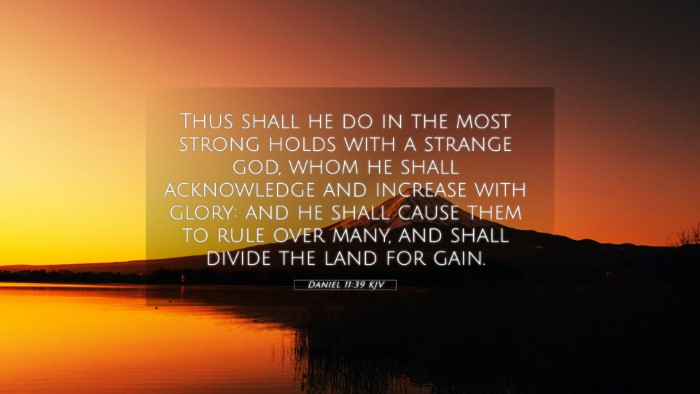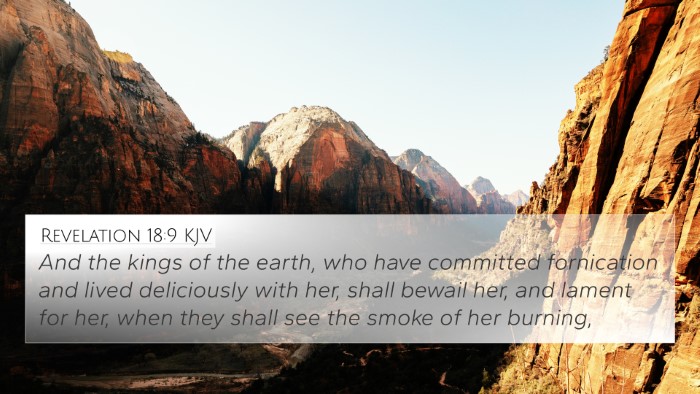Understanding Daniel 11:39 - A Comprehensive Analysis
Daniel 11:39 reads: "Thus shall he do in the most strong holds with a strange god, whom he shall acknowledge and increase with glory: and he shall cause them to rule over many, and shall divide the land for gain." This verse presents a significant insight into the attributes and actions of a powerful ruler, often interpreted as a prophetic reference to Antiochus IV Epiphanes or a future Antichrist figure. Below is a detailed examination and summary of various public domain commentaries, exploring the breadth of interpretations and insights this verse offers.
Meaning and Context
The passage is nestled in a complex prophetic narrative where Daniel receives visions about the future rulers of the world and their impact on Israel. This particular verse emphasizes:
- The Power of the Ruler: The "most strong holds" suggests he has significant military and political power.
- The Deception of a “Strange God”: The reference to a "strange god" indicates a reliance on foreign deities, reflecting syncretism and apostasy.
- Manipulation of Loyalty: The ruler gains the loyalty of people by acknowledging and promoting this false god, manipulating their faith for political gain.
- Exploitation: His actions include dividing the land for "gain," suggesting exploitation of territories for wealth and power.
Commentaries Insights
Here’s a summary derived from notable commentaries:
Matthew Henry
Henry interprets this leader as one who will cast off the true religion, substituting it with idolatrous practices. His rise signifies a time when true believers will face persecution, and the strength of his army will overshadow the moral laws.
Albert Barnes
Barnes emphasizes the political maneuvers of this ruler, suggesting that he employs cunning strategies to consolidate power over nations. The "strange god" represents the temptation for nations to abandon their sovereign beliefs in exchange for political favor.
Adam Clarke
Clarke elaborates on the phrase "divide the land for gain," indicating that this ruler will act selfishly, profiting at the expense of people and lands. His acknowledgment of this strange god further exemplifies a rejection of divine authority for personal ambition.
Related Bible Verses
This verse can be cross-referenced with the following scripture passages which deepen its understanding:
- Revelation 13:4: "And they worshipped the dragon which gave power unto the beast: and they worshipped the beast..." - showcasing the worship of false powers.
- 2 Thessalonians 2:4: "Who opposeth and exalteth himself above all that is called God..." - speaks of a figure that exalts himself above true worship.
- Isaiah 14:13-14: "For thou hast said in thine heart, I will ascend into heaven, I will exalt my throne above the stars of God..." - reflecting the arrogance of rulers.
- Psalms 2:1-3: "Why do the heathen rage, and the people imagine a vain thing?" - addressing the futility of rebellion against God.
- Matthew 24:15: "When ye therefore shall see the abomination of desolation..." - connecting to the prophecies of future events concerning God's people.
- Daniel 7:25: "And he shall speak great words against the most High, and shall wear out the saints of the most High..." - highlighting the tribulation faced by the faithful.
- Matthew 6:24: "No man can serve two masters..." - resonating with the idea of compromising faith for temporal power.
Thematic Connections
In studying this verse, it is essential to explore the thematic connections with broader biblical narratives:
- Idolatry vs. True Worship: This passage echoes the constant battle between fidelity to God and the allure of false gods.
- Corruption of Authority: The manipulation of loyalty highlights the corruption often found in human leadership.
- God’s Sovereignty: Despite the actions of this ruler, the overarching theme of God's control appears throughout the scripture.
Tools for Bible Cross-Referencing
When studying verses like Daniel 11:39, it is beneficial to utilize tools and methods for effective cross-referencing:
- Utilizing a Bible Concordance can help identify similar themes and terms across scriptures.
- A Bible cross-reference guide allows for easy navigation between related verses and themes.
- Cross-reference Bible study enables deeper exploration of how different verses illuminate one another.
- Online resources and applications also provide comprehensive Bible cross-reference materials for study.
Conclusion
Daniel 11:39 serves as a poignant reminder of the challenges faced by believers amidst corrupt leadership and the allure of false worship. Through careful study and cross-referencing with other Biblical texts, one can gain a deeper understanding of the nuances and warnings this passage offers. By recognizing its connections to other verses, readers can appreciate the rich tapestry of God's word, reflecting on how these themes resonate throughout Scripture.
Further Study Suggestions
For those looking to expand their understanding:
- Investigate the context of the subsequent verses in Daniel to see how they build on the themes introduced in 11:39.
- Consider studying the Book of Revelation to deepen understanding of end-time prophecy correlations.
- Engage in a comparative study of the Gospels to notice thematic parallels regarding authority and deception.



